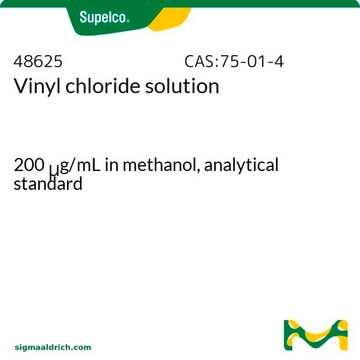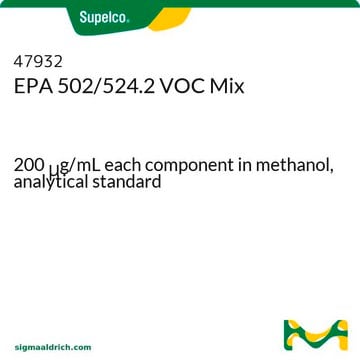500976
Vinyl chloride solution
certified reference material, 2000 μg/mL in methanol
About This Item
Recommended Products
grade
certified reference material
Quality Level
CofA
current certificate can be downloaded
packaging
ampule of 1 mL
concentration
2000 μg/mL in methanol
technique(s)
HPLC: suitable
gas chromatography (GC): suitable
application(s)
cleaning products
cosmetics
environmental
food and beverages
personal care
petroleum
format
single component solution
storage temp.
2-8°C
InChI
1S/C2H3Cl/c1-2-3/h2H,1H2
InChI key
BZHJMEDXRYGGRV-UHFFFAOYSA-N
Looking for similar products? Visit Product Comparison Guide
General description
Vinyl chloride, is a regulated and carcinogenic compound, belonging to the class of organochlorides. It is an industrially important chemical, used as a monomer in the production of polyvinyl chloride (PVC), which finds a variety of applications in food wrapping films, raincoats, electric insulation, pipes and bottles, plastic containers, etc.
Application
Other Notes
Signal Word
Danger
Hazard Statements
Precautionary Statements
Hazard Classifications
Acute Tox. 3 Dermal - Acute Tox. 3 Inhalation - Acute Tox. 3 Oral - Carc. 1A - Flam. Liq. 2 - STOT SE 1
Target Organs
Eyes,Central nervous system
Storage Class Code
3 - Flammable liquids
WGK
WGK 2
Flash Point(F)
51.8 °F - closed cup - Solvent
Flash Point(C)
11.0 °C - closed cup - Solvent
Personal Protective Equipment
Choose from one of the most recent versions:
Already Own This Product?
Find documentation for the products that you have recently purchased in the Document Library.
Our team of scientists has experience in all areas of research including Life Science, Material Science, Chemical Synthesis, Chromatography, Analytical and many others.
Contact Technical Service











